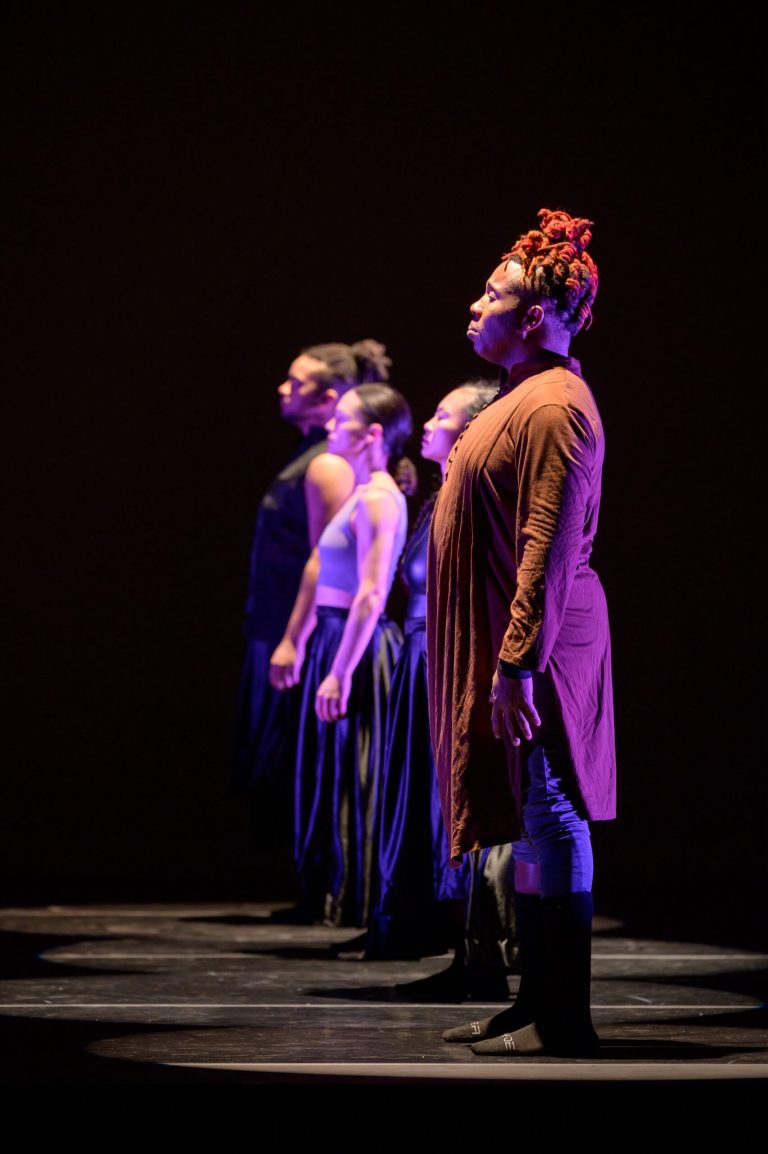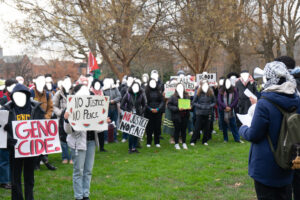Olivia Silvey ’25 & Iqra Athar ’26
Editor-in-Chief & News Editor
Approximately 80 students walked out of the recent Peace Vigil held for Palestine & Israel by the Chapel on Wednesday, Nov. 29, in the Washington Room in Mather Hall. The students expressed a sense of insecurity on campus, citing concerns about the language used by the administration regarding the recent shooting under investigation as a hate crime, among other beliefs outlined in a speech by Professor Ibrahim Shikaki. Students were silent throughout the beginning of the vigil and during the peaceful walkout, many wearing the traditional Palestinian keffiyehs in solidarity. Some faculty members also walked out following Shikaki’s speech. Around 30 individuals stayed in the room, including College officials such as Vice President for Student Success and Enrollment Management Joe DiChristina, Vice President for Diversity, Equity and Inclusion Anita Davis, and President Joanne Berger-Sweeney, who has been criticized for not attending previous campus events held to express support for or grievances of Palestinians on campus.
The Trinity Student Coalition for Justice in Palestine, operating under seemingly decentralized leadership, arranged for Shikaki to elaborate on their decision to walk out during his speech. Shikaki, after reciting a poem by Palestinian poet Mahmoud Darwish, addressed the students, stating, “You wanted me to speak last because the representatives of other groups should decide to say their piece [referencing previous speakers such as Chaplain Marcus Halley, Rev. Bo Doek Sunim from White Lotus Zen Haven and Rabbi Rachel Putterman]; you have also decided to walk out in silence and respect, with a strong message that you feel… voiceless.”
Continuing his address, Shikaki stated, “You asked me to share that you do not feel safe, that the head of the institution did not attend events, that the language used was dangerous. You are disappointed to have communicated this multiple times to no avail.” Once Shikaki concluded his remarks, the large group of students walked out of the event, leaving the space relatively empty.
After the students and some faculty members walked out, Halley acknowledged that he was “experiencing sadness that many have chosen not to be a part… but [experiencing] joy for a moment that we were all in the same room together. That matters.” Halley encouraged attendees to step into the circle and share their emotions with the audience; a small variety of students, staff members and administrators spoke briefly. Halley ended with a prayer.
Attendees were encouraged to write cards to the recent Trinity student who was recently shot in Vermont. This walkout occurred only a few days after the shooting. The administration’s statement, released almost 24 hours after the students were assaulted, attributed the incident – which is being investigated as a hate crime by the federal and local governments – to “gun violence.” As a response to the shooting and the administration’s statement, multiple student organizations released their own statements and messages of solidarity with the injured students.
Imani Black Student Union’s statement read, “In the wake of this tragedy, Trinity’s administration failed to adequately address what transpired. Not only did it take hours to release a statement regarding the incident, but the statement that was released was superficial and did not consider the hate-filled motivation behind the shooting. This was not simply a random act of “gun violence.”” In an email on Nov. 27, the Student Government Association said, “While our official response may not be as timely as the message from Trinity’s administration, we have found that placing genuine thought and constructive intention behind our statement outweighs hastiness or superficiality.”
Berger-Sweeney’s absence from specific events was highlighted in the students’ statements at the vigil/walkout. After the attacks by Hamas on Israel on Oct. 7, and Israel’s subsequent retaliation, organizations held events on campus for students to process the violence. Zachs Hillel House held a Community Gathering and Vigil, the Chapel held a Community Vigil for Peace and Hope and the Muslim Student Association (MSA) held a Community Gathering and Prayer for Palestine. While Berger-Sweeney attended the vigils at Hillel and the Chapel, she did not attend MSA’s event, nor Professor Shikaki’s Oct. 26 presentation and discussion on the history of Palestine and its relationship with Israel.
The recent shooting of Trinity’s own student in Vermont has garnered significant local and national attention from media outlets over the past few days, with reporters from NBC arriving on campus the day of the Chapel’s Nov. 29 vigil, and other outlets releasing news stories about on-campus activity related to the shooting response. However, none of the local news sources, including Hartford Courant, CT NPR and WFSB, were allowed inside the Washington Room during the vigil; the sources reported on the vigil and shooting, but did not report on the walkout. The Trinity Campus Weekly newsletter released on Dec. 1 highlighted the Vigil for Palestine and Israel, but also neglected to mention the students’ walkout.







+ There are no comments
Add yours